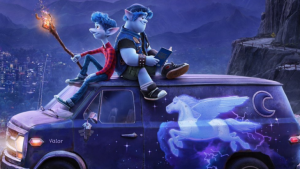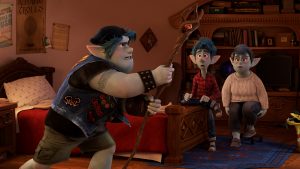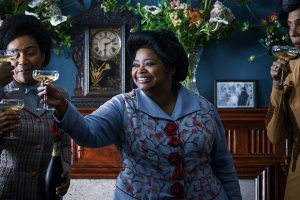MAJOR SPOILERS FOR ONWARD…AND THE LETTER FOR THE KING…AHEAD
Onward was never really on my radar – when the trailers came out, I thought they were weak, and I never even got to see the film in theaters due to the coronavirus. But now that I have seen it, I can’t stop thinking about this strangely endearing story, which so many other critics have said is merely okay: an enjoyable, but easily forgettable, offering from a studio that has produced instant classics. That may be true for some, but I’m not ashamed to say that Onward is quickly becoming one of my favorite Pixar films.

I’m thankfully not alone in this opinion. But my opinion on the film has grown stronger and stronger with each passing day (and rewatch). And I have a few theories on why this film speaks so much to me, and why I think it has already become one of Pixar’s most underrated offerings: a story that deserves to be exalted, and is instead being bullied for its simplicity, so-so worldbuilding, and subversion of tropes – which has itself become something of a trope, though I maintain that Onward does it in the best way possible, and that’s because it borrows the inspiration (just the inspiration, mind you, everything else about it is different) for its most crucial subversive element from The Lord Of The Rings.
Now, Onward borrows a lot of stuff from J.R.R. Tolkien’s masterpiece, it’s true. There are little details hidden all over the richly-detailed fantasy world, and, unsurprisingly, many of them harp back to the man who is described as the father of modern fantasy. Fast-food restaurants serving second breakfast, soft drinks named Mountain Doom (with “explosive caffeine!”), an image of what I believe to be Gandalf versus The Balrog in the back of Barley’s van…basically, all the usual stuff that would make me slightly biased in this film’s favor. But no, I don’t love it solely because of that. Nor do I love it solely because everyone in the film is an LGBTQ+ icon (though, if you’re interested, feel free to check out my non-existent TED talk about how Laurel and The Manticore are absolutely canon, the pawn shop owner radiates big boss lesbian energy, and Barley is a chaotic gay cinnamon roll). Sure, those things contribute to the film’s overall appeal – but what I love most about it is how it finally clarifies that Samwise Gamgee was the true hero of The Lord Of The Rings.

If you don’t already know, let me explain: in the Tolkien fandom, there has always been a war between “stans” of Frodo, and “stans” of Samwise Gamgee – a “stan” being a person who devotes themselves, wholly and unconditionally, to one specific person, fictional character, or thing. I’m not a big fan of stanning anyone or anything, simply because stans often become so passionate about whatever they’re stanning that they refuse to see its faults, and instead become toxic and hyper-aggressive when they see a threat to their idol. In the case of The Lord Of The Rings, it’s either really sad or really unsurprising that a story about unconditional love and loyalty would attract so many stans – who often divide themselves into either Frodo stans or Samwise stans. However, all you toxic Samwise stans are off the hook today, because I’m not coming for you – I’m coming for the toxic Frodo stans, and their idea of what makes a true hero.
J.R.R. Tolkien described Samwise Gamgee as the true hero of his story. Needless to say, Frodo stans have never liked this tidbit of trivia, and typically disregard it, either choosing to scream “DEATH OF THE AUTHOR!,” as loudly as possible, or snobbily remarking that “well, Tolkien didn’t write it that way”. Well, actually, he did – though, admittedly, everyone has differing opinions, and I respect that. But Onward uses the same formula for its hero and protagonist and makes it even less disputable.

In my opinion, what Frodo stans often overlook is that a story’s hero isn’t always its protagonist, nor vice versa. It’s rare to find, indeed, though I can actually name at least one other story this year that has done it…in a way. I say “in a way” because, while Netflix’s The Letter For The King turns the tables on its main character and reveals that one of his supporting cast, a young woman, is actually the hero of prophecy, and destined to defeat the villain, she never actually becomes the hero of the story. She’s a central plot-point, but that’s all she is: she’s just there to fight the big bad. In trying to create a surprise hero reveal, Netflix accidentally made their surprise hero the surprise protagonist of the series, while the character who was both hero and protagonist up until that point became solely the hero.
Because here’s the thing, which I’ve found is true across several different mediums: a hero doesn’t have to be the character whose name is in the title, or who gets to fight all the big sword-battles, or wield all the cool magic powers. From my experience, a story’s hero is often the overlooked beating heart of the story, the character around whom the entire story revolves without us ever noticing, usually until the very end. Sam, for instance, is the hero of The Lord Of The Rings – he represents everything the good guys are fighting for, and, without him, the story falls apart: not only because without him Frodo would have died several times before ever reaching Mordor, but because without him, The Lord Of The Rings isn’t the story of unconditional love, unbreakable friendship and unquenchable hope that we know it to be. Without him, in fact, it’s a pretty dark tale. So Sam is the true hero of that story because he is its core, the rock upon which the story is built, and Frodo is the protagonist: the character at the center of the plot – and he’s important too, because he teaches us about the importance of mercy and forgiveness, and how power corrupts. But when Frodo lies, maimed and spiritually exhausted on the slopes of Mount Doom, who is there beside him at the end of all things? Sam, that’s who. And it’s Sam’s presence there that reminds us what the story is all about: hope enduring even in darkness, and love defeating evil. For me, this is what defines a hero versus a protagonist, and shows how both can exist in one story without necessarily being the same person – a story’s true hero is the character who best personifies the themes and moral of the story, if there is one, while the protagonist is the most important character in the plot.

And that brings us back to Onward, and the case of Barley and Ian. For most of the film’s duration, it seems clear who is both hero and protagonist: Ian Lightfoot. He’s our POV character the entire time; he’s the one who initiates the quest when he finds out he’s the only character who can use magic; he’s the character who fights all the big fights, overcomes all the hardest obstacles, and has the big third-act battle against the fire-breathing dragon. But that doesn’t make him the hero – as it turns out, Ian is the protagonist, while his overlooked and underestimated older brother Barley Lightfoot is the story’s true hero.
It might sound unthinkable. But Onward isn’t just the story of two boys trying to meet their father – it’s a celebration of parents and parental figures in general. That’s why the father is the elusive end-goal of the movie’s plot. That’s why Laurel, the boys’ mother, follows them on their quest and has a key role in the final battle. That’s why there’s a subplot with the boys’ stepfather, whom they initially dislike but learn to accept. That’s why the big revelation at the end of the movie is that Barley Lightfoot has always been Ian’s own father figure growing up, and that Ian always did know his father, through Barley. And that’s why, in a moving act of gratitude, Ian returns the favor by giving Barley, and Barley alone, the chance to reunite with the ghost of their father in the film’s epic conclusion. That’s not entirely by choice – there’s a large dragon headed their way, and one of them has to stop it before it kills them all – but that makes it more powerful: because by that point, Ian’s character arc has concluded. He’s already figured out what and who the story is all about. But Barley still hasn’t: in a noble act of self-sacrifice, he offers to go hold off the dragon and give Ian the chance to meet their dad. But Ian stops him, telling him that now, Barley deserves what Ian always had: a chance to share his life, even for a moment, with his own father figure. Suddenly, Barley Lightfoot is the true heart, soul and hero of the story, and he best represents what the film is all about.
Now, a celebration of unconventional parental figures and older siblings isn’t anything new – the Frozen series and Lilo & Stitch are two other animated movies that give older siblings all the respect they deserve, and in fact Barley Lightfoot shares a couple characteristics with Elsa in particular (make them both gay, you cowards!) – but Pixar’s spin on the material gives it a truly unique twist. And in so doing, whether intentionally or not, they have paid homage to the father of modern fantasy.

And there you have it. At this point I’ve likely angered a fair number of Frodo stans (but don’t worry, I still love all most some a few of you), and I’ve rambled on for far too long. Share your own thoughts, theories and opinions in the comments below!
Oh, and one last thing. My initial rating for Onward was too low, so allow me to do something I almost never do, and revise it:
Rating: 9.5/10





